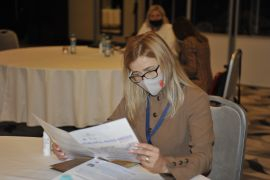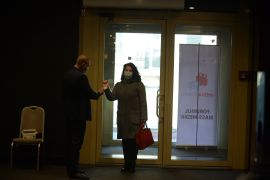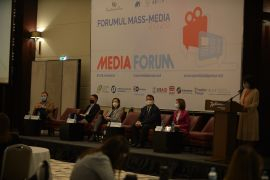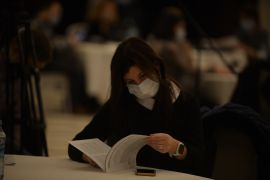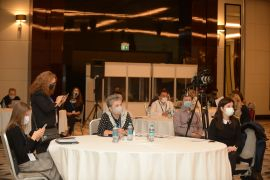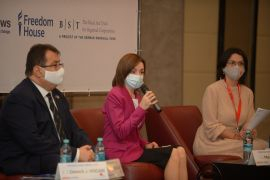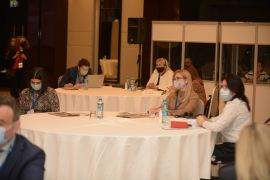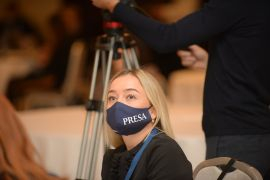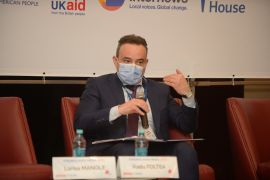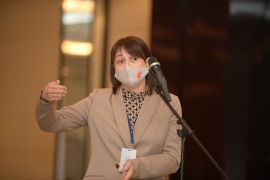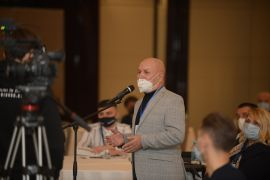back
2020 Media Forum. On Adapting Media to Crisis Conditions, Pandemic Survival, and Misinformation
The sixth edition of Moldova Media Forum took place in Chisinau on 24 and 25 November 2020. Due to the COVID-19 pandemic, the Forum took place in a mixed format: the opening and closing sessions were attended by a small number of delegates, and the other sessions took place online. Over 140 participants who had registered online in advance for the Forum attended live and online the debates, presentations, master classes and workshops held during the Forum’s two days.
At the opening of the Forum, Viorica Zaharia, President of the Press Council, spoke about the impact of the COVID-19 pandemic on the work of the Moldovan journalists: “The pandemic has emphasised at least two of the existing problems – the access to information and the fake news. In order to fix the first cases of COVID-19 infection among doctors in March, the journalists had to insist for a few days before the authorities, so that to find themselves with allegations from the Government that they were pursuing the sensational by requesting such information. It was clear that there was an attempt to hide the information so that to give the impression that the situation was ‘under control’. We can assume that it was that hiding of data in the first days that favoured the rapid spread of fakes about this disease. It is worth noting the efforts of the journalists from different media who focused on checking every piece of information that came from hospitals or other sources, to refute the fakes and misinformation.”
Present at the event, Maia Sandu, the President-elect of the Republic of Moldova, noted the importance of press freedom for our country: "Free press must become a reality in the Republic of Moldova, free everywhere and for everyone if we want true democratic processes; if we want people to make informed decisions, not to be manipulated when deciding their future, we must all make every effort, the media outlets and the state institutions. And we should eliminate all possibilities for misinformation to flourish in the Republic of Moldova.” Maia Sandu also made a commitment to the journalists: “I want to make a commitment here – the President’s Office will become an open and transparent institution that will offer information and will present things as they are. That is what we did in the Government, in those five months, and that is how we will act in the President’s Office.”
Peter Michalko, the EU Ambassador to Moldova, also came with a message to the media representatives. "Now is the time to bring all stakeholders together and address systemic issues in the media sector without which you cannot build a strong society and responsible institutions. We will continue to support the media at regional and local levels, which is important for the people,” the head of the EU Delegation said. The diplomat called on the Parliament and the Government "to renew the discussions on improving the legal framework for the media and to strengthen transparent oversight of the Broadcast Council’s work.”
The US Ambassador to Moldova Dereck J. Hogan sent an online message calling on the authorities to make firm commitments to improve the country's media situation. “Moldova needs honest voices in the media, citizens need access to a variety of media sources, and we must all learn to identify misinformation when we see it. Without the firm commitment of the Moldovan leaders, the situation of Moldovan media will not improve," the US Ambassador stressed.
The opening session of the Forum was also attended by Angela Ganninger, the Ambassador of Germany to the Republic of Moldova, who referred to the importance of credible sources of information in times of crisis. “This is the first time in a pandemic that technologies and social networks have been able to inform people on a large scale and keep them ‘safe’. The professional media sources have helped people, by checking the facts, to understand and distinguish a correct message from a manipulative one,” the Ambassador said.
In a video message, Steven Fisher, the British Ambassador to the Republic of Moldova, noted that the media and state institutions must have a clear agenda to combat misinformation. “We support the development of independent, impartial and professional media that offer citizens access to different opinions and the creation of a media sector more resistant to political and financial pressures. The challenge is even greater in the era of fake news and rapid development of the digital information space,” the Ambassador added.
The foreign representatives emphasized they would continue to provide support for the development of professional, sustainable and accountable media outlets before the public. A similar message was sent by Petru Culeac, Executive Director of the Soros Foundation Moldova.
Fadei Nagacevschi, Minister of Justice, and Adrian Lebedinschi, Chairman of the Parliamentary Committee on Culture, Education, Research, Youth, Sports and the Media, also spoke at the opening. They said they were open to considering proposals to amend the legislation, made by the media community. During the ensuing debate, Vasile Nastase, MP, Deputy Chairman of the line parliamentary commission, announced that the working group for media legislation improvement was to resume operation in the near future.
The debate "National Concept of Media Development and the Code of Broadcast Media Services at Two Years of Implementation" was attended by Adrian Lebedinschi, MP, the Secretary of State of the Ministry of Justice Radu Foltea, and Broadcast Council member Larisa Manole. The Media expert Ion Bunduchi, author of an analytical report on this topic, pointed out: “We have a sufficient regulatory framework to develop and implement action plans in the media segment, but two years after we have had this legal framework, things are not moving. We have people in charge of drafting documents, but when we start looking for who is to blame for the fact that things are standing still, they cannot be identified.” The representatives of the Parliament, the Ministry of Justice and the Broadcast Council presented their visions on the development of the media field and answered the questions of the moderator Tatiana Puiu and of the participants in the debate.
A number of online events took place during the two days of the Forum. The debate “A Chokehold on Media Freedom: Navigating Law and Policy Restrictions under Pandemic Conditions” brought together experts and officials from Moldova, Latvia, Ukraine and the international organization Freedom House. Following the discussions, it was found that the media can and must be a key player in managing the pandemic crisis and a reliable partner of the authorities in their efforts to fight the effects of the pandemic; however, the media's ability to contribute to overcoming the crisis largely depends on the actions of the rulers who should support the media and not impose unjustified restrictions, said Anastasia Nani, Deputy Director of the Independent Journalism Centre, in the session to present the outcomes of the Forum.
The Georgian expert Tea Tabagari and Irina Ghelbur, director of Interakt Media, hosted a workshop on effective models of monetization of journalistic content and other types of supplementation of a newsroom’s budget. They urged the journalists to capitalize on various economic opportunities. “We should not rely on a single source of funding. A media outlet must look at itself as a business model and follow its financial indicators as often as it follows its audience indicators," Irina emphasized.
The editorial management during the pandemic was discussed at the workshop moderated by the media expert Ioana Avadani, president of the Centre for Independent Journalism in Bucharest (Romania), who spoke about how newsrooms in various countries of the world have coped with the crisis. At the same workshop, Galina Vasilieva, editor-in-chief of the Newsmaker.md portal, talked about the managerial and editorial challenges faced by their editorial staff.
A captivating workshop and an interesting discussion about the future of news production took place in an online workshop with the experts Grzegorz Piechota, researcher at the International News Media Association (INMA) and Dumitru Ciorici, development manager for Agora.md.
The topic of journalism funding and ensuring the transparency of funding sources was debated in the workshop moderated by the international expert Marius Dragomir from the Centre for Media, Data and Society in Budapest (Hungary), and Vasile State, president of the Electronic Press Association APEL.
During the Forum, the well-known investigative journalist from Russia Roman Anin, born in the Republic of Moldova, held a master class on the use of new technologies in documenting investigative reports that concern corruption schemes.
During the 2020 Media Forum, the 2020 National Journalist Ethics and Deontology Prize was awarded, and the six winners of the “2020 Investigative Media Reports” national competition were announced. The “Black Book of Public Money Waste”, 2020 edition, and the national study "People's Perception of the Media and Media Skills in the Republic of Moldova" were launched.
During the total-up session, moderated by Petru Macovei, Executive Director of the Association of Independent Press, the Forum's experts and delegates, including those who logged in online, discussed the results of the debates and made proposals for the draft 2020 Media Forum Resolution. The draft resolution was approved by the participants and the Forum’s organizers and experts will examine any completion proposals within the next 10 days, and will publish the final text of the Resolution.
The videos from all 2020 Media Forum events will be posted in the upcoming days on the website https://mediaforum.md/event/2020 in the “Gallery” column.
The Media Forum is convened annually by the Press Council in partnership with the Association Independent Press (API), the Independent Journalism Centre (IJC) and the Electronic Press Association APEL to discuss the issues of the Moldovan journalistic community and identify and promote solutions to strengthen editorial independence and media quality.
The holding of Moldova Media Forum is funded by Soros Foundation Moldova. The 2020 edition of the Forum was co-funded by the Friedrich Naumann Foundation for Freedom (Germany) and DW Akademie (Germany). The event was part of the project "Press in Support of Democracy, Inclusion and Accountability in Moldova" (MEDIA-M), funded by USAID and UK aid, and implemented by Internews in Moldova, the Independent Journalism Centre and Freedom House. This event was made possible also with the support of the Black Sea Trust for Regional Cooperation and the Friedrich Naumann Foundation for Southeast Europe.
